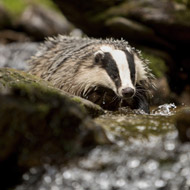Response to reports of badger cull extension

Shooting of badgers forms part of the government's 25-year strategy to rid England of TB.
The debate on badger culling has reignited after the BBC reported that culling will be extended to five new areas across three counties. Defra has not confirmed the reports, however, but said Natural England is 'considering' applications for further badger control licences.
BBC News said it had learned badger shooting would begin early next month in South Devon, North Devon, North Cornwall, West Dorset and South Herefordshire.
Badger culling is already practised in Somerset, Gloucestershire and Dorset. Shooting of badgers forms part of the government's 25-year strategy to rid England of TB.
Responding to the BBC's claims, Defra said in a statement: 'Natural England is currently considering applications for further badger control licences as part of the usual licensing process.
'England has the highest incidence of TB in Europe and that is why we are taking strong action to deliver our 25-year strategy to eradicate the disease and protect the future of our dairy and beef industries.
'Badger control in areas where TB is rife is one part of our long-term plan, which also includes strengthening cattle testing and movement controls and improving biosecurity on farm and when trading.
'This comprehensive approach has worked overseas and is supported by the Government and Defra chief scientists and leading vets.'
However, the BBC said it understands culling companies have already been selected and marksmen trained in the new areas. Farmer Tony Francis is reported to have said he signed up to one of the new cull zones to help prevent TB returning to his herd near Okehampton in Devon.
He is quoted as saying: "It's an issue which has been going on for decades. No one has really got on top of it. I think the agricultural industry feel we've got to try and take control of it."
Commenting on the reports, BVA president Sean Wensley said the organisation recognises the need to control the wildlife reservoir for TB, as part of a strategy to eradicate the disease. But he reiterated concerns about the controlled shooting method being used.
"BVA supports the wider roll-out of culling to carefully selected areas where badgers are regarded as a significant contributor to the high incidence of bovine TB in cattle, through the use of cage trapping and shooting only; we do not support the continued use of controlled shooting as part of the badger control policy."
Speaking on BBC Radio 5 Live this morning, Badger Trust CEO Dominic Dyer, said the decision to roll out the cull was "catastrophic", citing recent research by ZSL which suggests badgers may not spread TB through direct contact with cattle.



 The veterinary mental health charity Vetlife is inviting the veterinary community to join it for a sponsored cold-water dip.
The veterinary mental health charity Vetlife is inviting the veterinary community to join it for a sponsored cold-water dip.